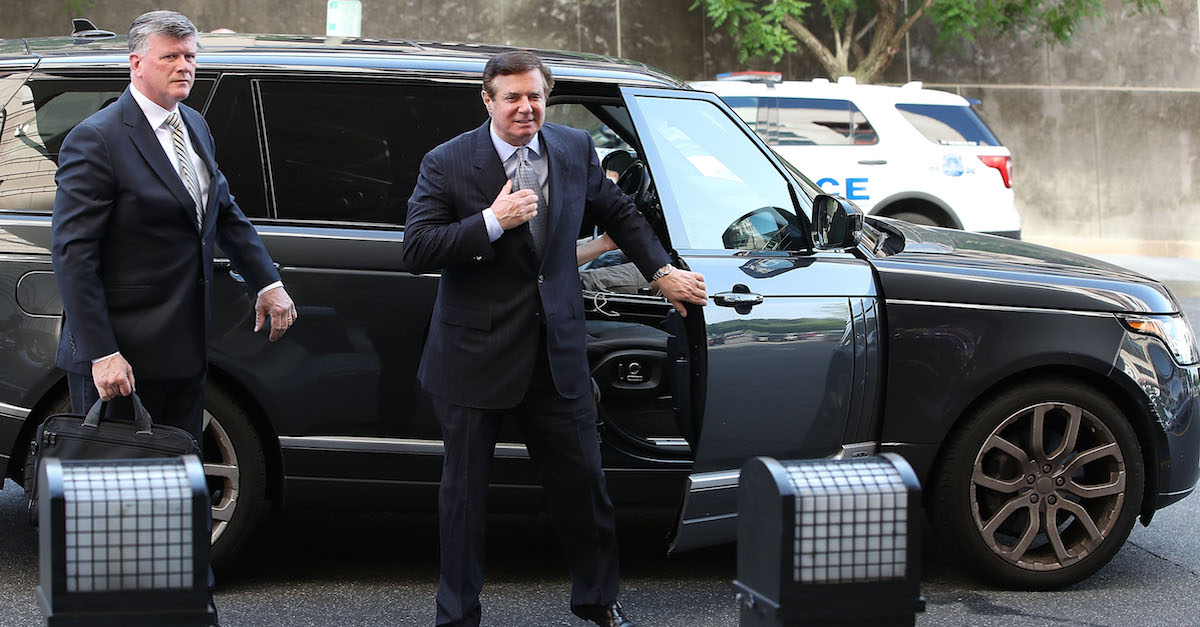
Former Trump 2016 campaign chair Paul Manafort essentially accused special counsel Robert Mueller‘s attempting to create federal crimes where none actually exist, according to a court brief submitted Wednesday morning.
In their 17-page motion filed with the U.S. District Court for the District of Columbia, Manafort’s attorneys offered the defense’s latest salvo in the ongoing drama as to whether Manafort “lied” about various issues during a series of cooperation meetings with the special counsel’s office after pleading guilty to several crimes in Washington, D.C.
“Mr. Manafort did not lie,” the defense motion begins, “Despite the considerable efforts of the Office of Special Counsel, it cannot prove what did not happen.”
The filing continues:
At the outset of [a recent] hearing, the Court raised the issue of whether the [special counsel] needed to prove materiality on any of the alleged false statements asking, “Well, does materiality matter?” Surprisingly, the [special counsel], despite alleging that Mr. Manafort committed “federal crimes,” which require a showing of materiality, responded by saying we “don’t think it does.”
Under the federal law prohibiting false statements during an official proceeding, the concept of materiality is explicitly necessary; the words “material” and “materiality” are contained in each relevant prong of the statute (18 U.S.C. §1001).
Criminal defense lawyer and former Assistant U.S. Attorney Ken White described the real-life import of the materiality provision in a thread on Twitter late last year:
One element of 1001 – that is, one thing the government must prove to convict you — is that your statement was “material.” “Material,” in law, generally means “capable of making a difference.” The false statement must, in some way, matter to the proceeding you’re lying in. … But here’s the trick. The “materiality” element for 1001 has been watered down. It doesn’t require that your lie ACTUALLY made any difference whatsoever. Just that it’s the SORT of lie that hypothetically COULD in such a case.
Manafort’s attorneys, however, don’t appear to be simply making the case that their client’s alleged lies were not material–they’ve also quoted Mueller deputy Andrew Weissmann as suggesting that materiality isn’t really an issue.
The defense also disputes the idea that Manafort lied at all.
Recall: Chief among the lying accusations leveled against Manafort is the idea that the defendant denied sharing polling data with Russian political operative Konstantin Kilimnik during the 2016 presidential campaign. Kilmnik is alleged to have substantial ties to intelligence agencies affiliated with the Russian Federation. Mueller’s office, during last week’s hearing, noted that their source for this accusation is former Trump campaign deputy chairman Rick Gates.
Unfortunately, this specific allegation is addressed in a section of the Wednesday filing which is heavily redacted. Manafort’s attorneys do appear to generally contest the notion and assert at one point regarding the meeting where Manafort is alleged to have shared such data: “This is just a theory, however, and it does not hold up.”
Mueller’s major contention concerning Manafort’s allegedly lying is mainly premised on an FBI report summary known as an “FD-302” which was filled out after Manafort sat down with government investigators to discuss his relationship–and admitted crimes committed–with Kilimnik.
Manafort’s attorneys admit that things got “off course” during that interrogation session and that their client and the government “were not on the same page” about the Kilimnik relationship. This necessitated a “brief break” wherein Manafort huddled with his legal team, went back into the interrogation room and subsequently corrected himself. This almost immediate correction, the defense maintains, show that Manafort did not intentionally try to mislead the special counsel’s office during his ill-fated cooperation agreement.
“[E]ven if one has some concern about how the FBI’s summary report reads, it does not provide the evidentiary basis for finding that Mr. Manafort intentionally misled the investigators,” the filing argues. “The Court itself noted this potential issue.”
Indeed, the defense motion presents two snippets of commentary from U.S. District Judge Amy Berman Jackson who notes her own uneasiness with relying simply on the FBI’s report summary–as well as her confusion as to why the government is so keen on viewing Manafort’s brief departure from what the government understood to be the facts.
“[G]iven his correction after consultation with counsel, why would this be something that we would characterize as the crime of making an intentionally false statement to the FBI, or even just a [lie] of significance for acceptance of responsibility in sentencing purposes?” Judge Berman asks mid-way through the transcript from last week’s hearing before later saying,”I may not be able to resolve [the lying accusations] on the face of the 302.”
[image via Mark Wilson/Getty Images]